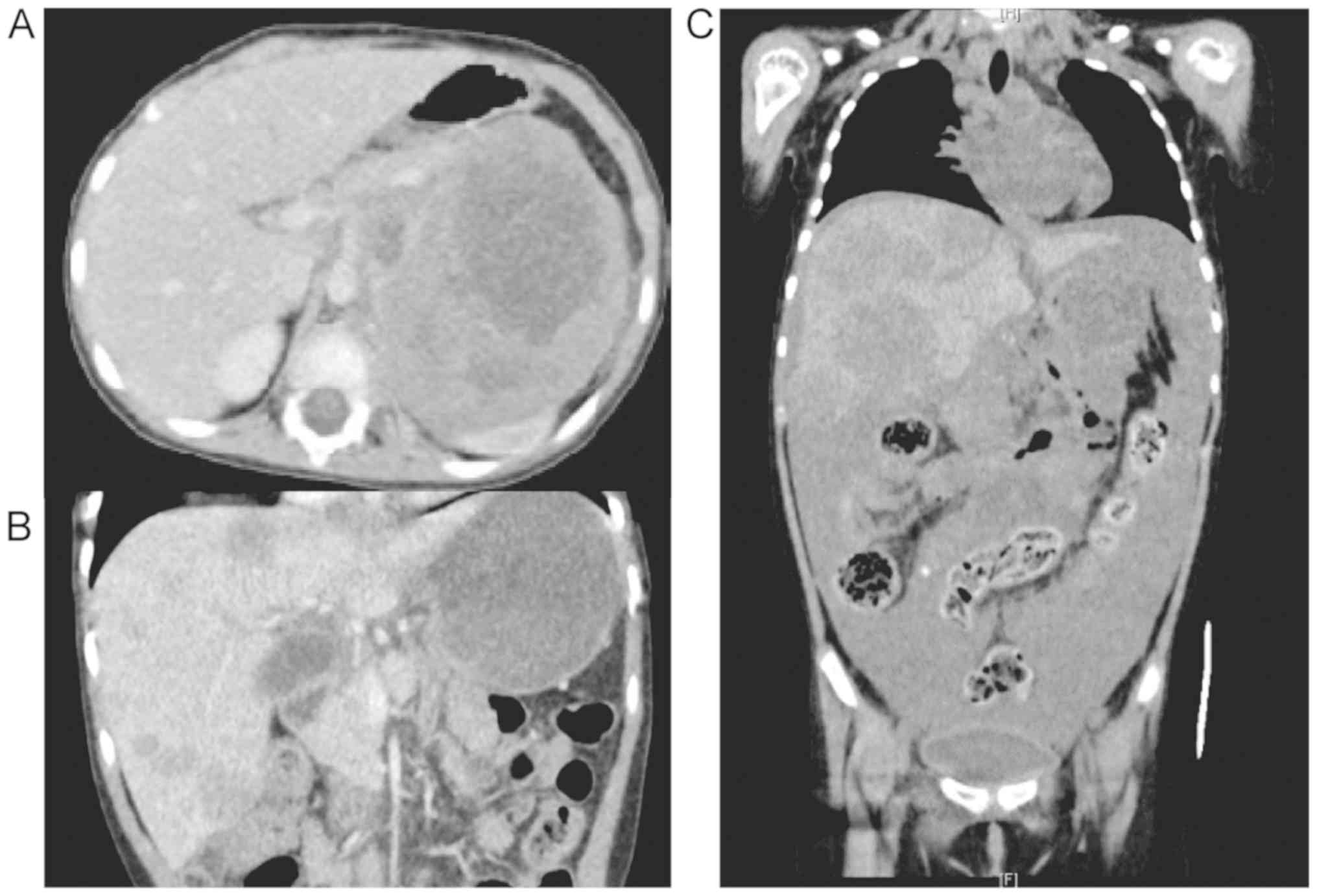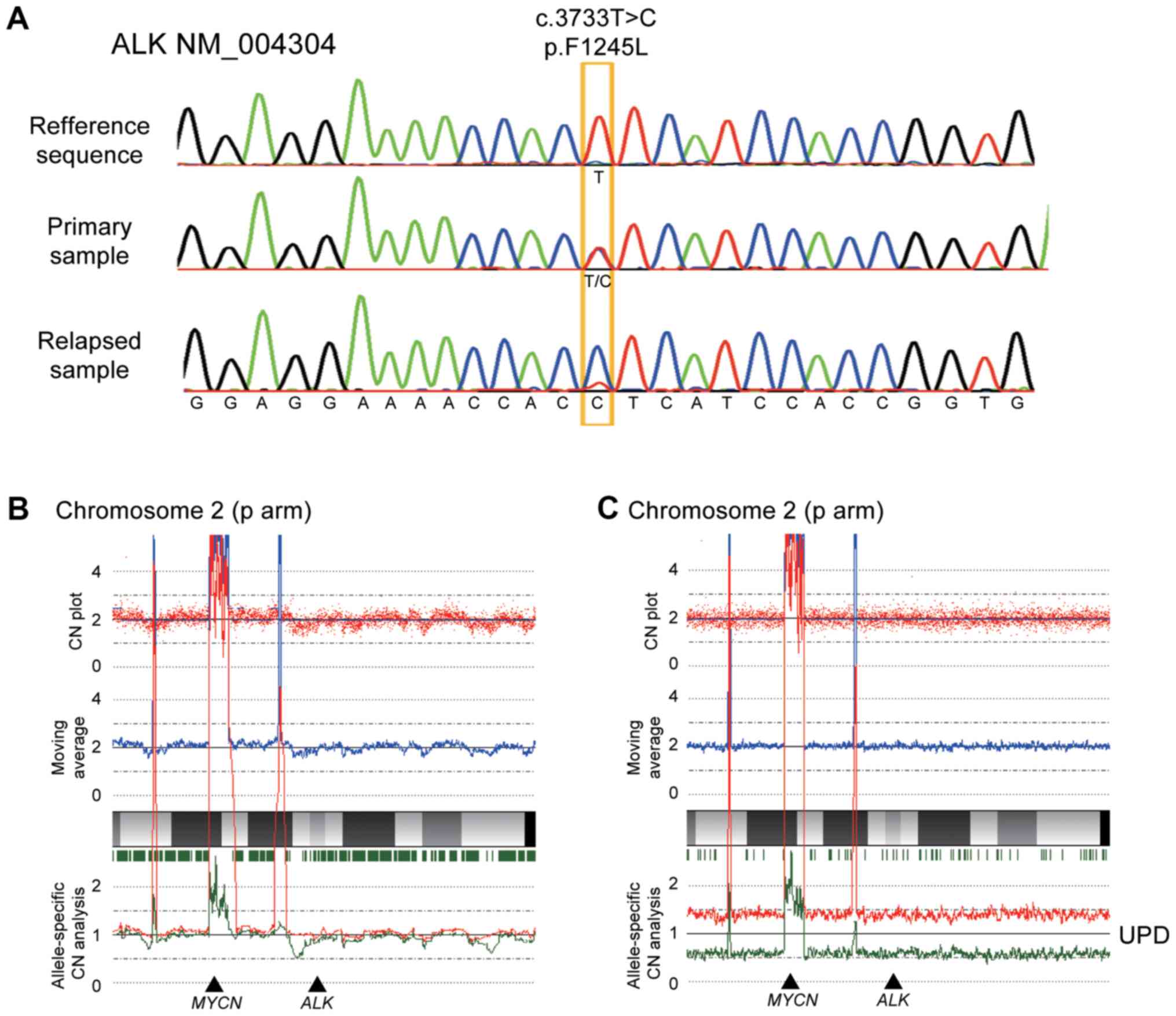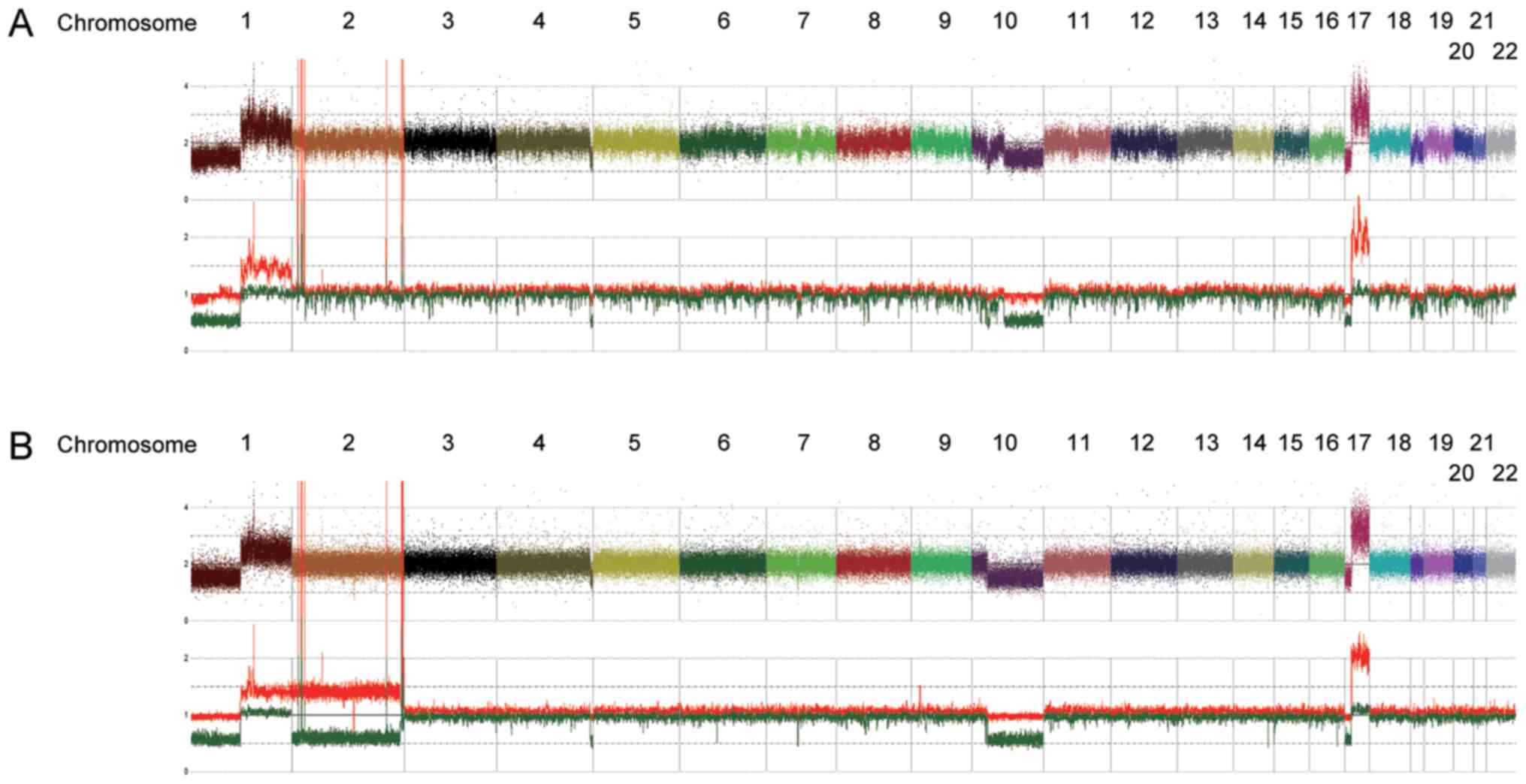|
1
|
Cheung NK and Dyer MA: Neuroblastoma:
Developmental biology, cancer genomics and immunotherapy. Nat Rev
Cancer. 13:397–411. 2013. View
Article : Google Scholar : PubMed/NCBI
|
|
2
|
George RE, Sanda T, Hanna M, Fröhling S,
Luther W II, Zhang J, Ahn Y, Zhou W, London WB, McGrady P, et al:
Activating mutations in ALK provide a therapeutic target in
neuroblastoma. Nature. 455:975–978. 2008. View Article : Google Scholar : PubMed/NCBI
|
|
3
|
Janoueix-Lerosey I, Lequin D, Brugières L,
Ribeiro A, de Pontual L, Combaret V, Raynal V, Puisieux A,
Schleiermacher G, Pierron G, et al: Somatic and germline activating
mutations of the ALK kinase receptor in neuroblastoma. Nature.
455:967–970. 2008. View Article : Google Scholar : PubMed/NCBI
|
|
4
|
Chen Y, Takita J, Choi YL, Kato M, Ohira
M, Sanada M, Wang L, Soda M, Kikuchi A, Igarashi T, et al:
Oncogenic mutations of ALK kinase in neuroblastoma. Nature.
455:971–974. 2008. View Article : Google Scholar : PubMed/NCBI
|
|
5
|
Bresler SC, Weiser DA, Huwe PJ, Park JH,
Krytska K, Ryles H, Laudenslager M, Rappaport EF, Wood AC, McGrady
PW, et al: ALK mutations confer differential oncogenic activation
and sensitivity to ALK inhibition therapy in neuroblastoma. Cancer
Cell. 26:682–694. 2014. View Article : Google Scholar : PubMed/NCBI
|
|
6
|
Pugh TJ, Morozova O, Attiyeh EF,
Asgharzadeh S, Wei JS, Auclair D, Carter SL, Cibulskis K, Hanna M,
Kiezun A, et al: The genetic landscape of high-risk neuroblastoma.
Nat Genet. 45:279–284. 2013. View
Article : Google Scholar : PubMed/NCBI
|
|
7
|
Martinsson T, Eriksson T, Abrahamsson J,
Caren H, Hansson M, Kogner P, Kamaraj S, Schönherr C, Weinmar J,
Ruuth K, et al: Appearance of the novel activating F1174S ALK
mutation in neuroblastoma correlates with aggressive tumor
progression and unresponsiveness to therapy. Cancer Res. 71:98–105.
2011. View Article : Google Scholar : PubMed/NCBI
|
|
8
|
Mossé YP, Lim MS, Voss SD, Wilner K,
Ruffner K, Laliberte J, Rolland D, Balis FM, Maris JM, Weigel BJ,
et al: Safety and activity of crizotinib for paediatric patients
with refractory solid tumours or anaplastic large-cell lymphoma: A
children's oncology group phase 1 consortium study. Lancet Oncol.
14:472–480. 2013. View Article : Google Scholar : PubMed/NCBI
|
|
9
|
Kataoka K, Nagata Y, Kitanaka A, Shiraishi
Y, Shimamura T, Yasunaga J, Totoki Y, Chiba K, Sato-Otsubo A, Nagae
G, et al: Integrated molecular analysis of adult T cell
leukemia/lymphoma. Nat Genet. 47:1304–1315. 2015. View Article : Google Scholar : PubMed/NCBI
|
|
10
|
Haferlach T, Nagata Y, Grossmann V, Okuno
Y, Bacher U, Nagae G, Schnittger S, Sanada M, Kon A, Alpermann T,
et al: Landscape of genetic lesions in 944 patients with
myelodysplastic syndromes. Leukemia. 28:241–247. 2014. View Article : Google Scholar : PubMed/NCBI
|
|
11
|
Suzuki H, Aoki K, Chiba K, Sato Y,
Shiozawa Y, Shiraishi Y, Shimamura T, Niida A, Motomura K, Ohka F,
et al: Mutational landscape and clonal architecture in grade II and
III gliomas. Nat Genet. 47:458–468. 2015. View Article : Google Scholar : PubMed/NCBI
|
|
12
|
Cheng DT, Mitchell TN, Zehir A, Shah RH,
Benayed R, Syed A, Chandramohan R, Liu ZY, Won HH, Scott SN, et al:
Memorial sloan kettering-integrated mutation profiling of
actionable cancer targets (MSK-IMPACT): A hybridization
capture-based next-generation sequencing clinical assay for solid
tumor molecular oncology. J Mol Diagn. 17:251–264. 2015. View Article : Google Scholar : PubMed/NCBI
|
|
13
|
Molenaar JJ, Koster J, Zwijnenburg DA, van
Sluis P, Valentijn LJ, van der Ploeg I, Hamdi M, van Nes J,
Westerman BA, van Arkel J, et al: Sequencing of neuroblastoma
identifies chromothripsis and defects in neuritogenesis genes.
Nature. 483:589–593. 2012. View Article : Google Scholar : PubMed/NCBI
|
|
14
|
Valentijn LJ, Koster J, Zwijnenburg DA,
Hasselt NE, van Sluis P, Volckmann R, van Noesel MM, George RE,
Tytgat GA, Molenaar JJ and Versteeg R: TERT rearrangements are
frequent in neuroblastoma and identify aggressive tumors. Nat
Genet. 47:1411–1414. 2015. View
Article : Google Scholar : PubMed/NCBI
|
|
15
|
Eichenmüller M, Trippel F, Kreuder M, Beck
A, Schwarzmayr T, Häberle B, Cairo S, Leuschner I, von Schweinitz
D, Strom TM and Kappler R: The genomic landscape of hepatoblastoma
and their progenies with HCC-like features. J Hepatol.
61:1312–1320. 2014. View Article : Google Scholar : PubMed/NCBI
|
|
16
|
Sumazin P, Chen Y, Treviño LR, Sarabia SF,
Hampton OA, Patel K, Mistretta TA, Zorman B, Thompson P, Heczey A,
et al: Genomic analysis of hepatoblastoma identifies distinct
molecular and prognostic subgroups. Hepatology. 65:104–121. 2017.
View Article : Google Scholar : PubMed/NCBI
|
|
17
|
Seki M, Yoshida K, Shiraishi Y, Shimamura
T, Sato Y, Nishimura R, Okuno Y, Chiba K, Tanaka H, Kato K, et al:
Biallelic DICER1 mutations in sporadic pleuropulmonary blastoma.
Cancer Res. 74:2742–2749. 2014. View Article : Google Scholar : PubMed/NCBI
|
|
18
|
Pugh TJ, Yu W, Yang J, Field AL, Ambrogio
L, Carter SL, Cibulskis K, Giannikopoulos P, Kiezun A, Kim J, et
al: Exome sequencing of pleuropulmonary blastoma reveals frequent
biallelic loss of TP53 and two hits in DICER1 resulting in
retention of 5p-derived miRNA hairpin loop sequences. Oncogene.
33:5295–5302. 2014. View Article : Google Scholar : PubMed/NCBI
|
|
19
|
Seki M, Nishimura R, Yoshida K, Shimamura
T, Shiraishi Y, Sato Y, Kato M, Chiba K, Tanaka H, Hoshino N, et
al: Integrated genetic and epigenetic analysis defines novel
molecular subgroups in rhabdomyosarcoma. Nat Commun. 6:75572015.
View Article : Google Scholar : PubMed/NCBI
|
|
20
|
Shern JF, Chen L, Chmielecki J, Wei JS,
Patidar R, Rosenberg M, Ambrogio L, Auclair D, Wang J, Song YK, et
al: Comprehensive genomic analysis of rhabdomyosarcoma reveals a
landscape of alterations affecting a common genetic axis in
fusion-positive and fusion-negative tumors. Cancer Discov.
4:216–231. 2014. View Article : Google Scholar : PubMed/NCBI
|
|
21
|
Crompton BD, Stewart C, Taylor-Weiner A,
Alexe G, Kurek KC, Calicchio ML, Kiezun A, Carter SL, Shukla SA,
Mehta SS, et al: The genomic landscape of pediatric Ewing sarcoma.
Cancer Discov. 4:1326–1341. 2014. View Article : Google Scholar : PubMed/NCBI
|
|
22
|
Tirode F, Surdez D, Ma X, Parker M, Le
Deley MC, Bahrami A, Zhang Z, Lapouble E, Grossetête-Lalami S,
Rusch M, et al: Genomic landscape of Ewing sarcoma defines an
aggressive subtype with co-association of STAG2 and TP53 mutations.
Cancer Discov. 4:1342–1353. 2014. View Article : Google Scholar : PubMed/NCBI
|
|
23
|
Taylor-Weiner A, Zack T, O'Donnell E,
Guerriero JL, Bernard B, Reddy A, Han GC, Al Dubayan S,
Amin-Mansour A, Schumacher SE, et al: Genomic evolution and
chemoresistance in germ-cell tumours. Nature. 540:114–118. 2016.
View Article : Google Scholar : PubMed/NCBI
|
|
24
|
Sato Y, Yoshizato T, Shiraishi Y, Maekawa
S, Okuno Y, Kamura T, Shimamura T, Sato-Otsubo A, Nagae G, Suzuki
H, et al: Integrated molecular analysis of clear-cell renal cell
carcinoma. Nat Genet. 45:860–867. 2013. View Article : Google Scholar : PubMed/NCBI
|
|
25
|
Seki M, Kimura S, Isobe T, Yoshida K, Ueno
H, Nakajima-Takagi Y, Wang C, Lin L, Kon A, Suzuki H, et al:
Recurrent SPI1 (PU.1) fusions in high-risk pediatric T cell acute
lymphoblastic leukemia. Nat Genet. 49:1274–1281. 2017. View Article : Google Scholar : PubMed/NCBI
|
|
26
|
Shiraishi Y, Sato Y, Chiba K, Okuno Y,
Nagata Y, Yoshida K, Shiba N, Hayashi Y, Kume H, Homma Y, et al: An
empirical Bayesian framework for somatic mutation detection from
cancer genome sequencing data. Nucleic Acids Res. 41:e892013.
View Article : Google Scholar : PubMed/NCBI
|
|
27
|
Robinson JT, Thorvaldsdóttir H, Winckler
W, Guttman M, Lander ES, Getz G and Mesirov JP: Integrative
genomics viewer. Nat Biotechnol. 29:24–26. 2011. View Article : Google Scholar : PubMed/NCBI
|
|
28
|
Yamamoto G, Nannya Y, Kato M, Sanada M,
Levine RL, Kawamata N, Hangaishi A, Kurokawa M, Chiba S, Gilliland
DG, et al: Highly sensitive method for genomewide detection of
allelic composition in nonpaired, primary tumor specimens by use of
affymetrix single-nucleotide-polymorphism genotyping microarrays.
Am J Hum Genet. 81:114–126. 2007. View
Article : Google Scholar : PubMed/NCBI
|
|
29
|
Mossé YP, Laudenslager M, Longo L, Cole
KA, Wood A, Attiyeh EF, Laquaglia MJ, Sennett R, Lynch JE, Perri P,
et al: Identification of ALK as a major familial neuroblastoma
predisposition gene. Nature. 455:930–935. 2008. View Article : Google Scholar : PubMed/NCBI
|
|
30
|
de Pontual L, Kettaneh D, Gordon CT,
Oufadem M, Boddaert N, Lees M, Balu L, Lachassinne E, Petros A,
Mollet J, et al: Germline gain-of-function mutations of ALK disrupt
central nervous system development. Hum Mutat. 32:272–276. 2011.
View Article : Google Scholar : PubMed/NCBI
|
|
31
|
Bourdeaut F, Ferrand S, Brugières L,
Hilbert M, Ribeiro A, Lacroix L, Bénard J, Combaret V, Michon J,
Valteau-Couanet D, et al: ALK germline mutations in patients with
neuroblastoma: A rare and weakly penetrant syndrome. Eur J Hum
Genet. 20:291–297. 2011. View Article : Google Scholar : PubMed/NCBI
|
|
32
|
Lee CC, Jia Y, Li N, Sun X, Ng K, Ambing
E, Gao MY, Hua S, Chen C, Kim S, et al: Crystal structure of the
ALK (anaplastic lymphoma kinase) catalytic domain. Biochem J.
430:425–437. 2010. View Article : Google Scholar : PubMed/NCBI
|
|
33
|
Kato M, Yasui N, Seki M, Kishimoto H,
Sato-Otsubo A, Hasegawa D, Kiyokawa N, Hanada R, Ogawa S, Manabe A,
et al: Aggressive transformation of juvenile myelomonocytic
leukemia associated with duplication of oncogenic KRAS due to
acquired uniparental disomy. J Pediatr. 162:1285–1288, 1288.e1.
2013. View Article : Google Scholar : PubMed/NCBI
|
|
34
|
Ma ES, Wong CL, Siu D and Chan WK:
Amplification, mutation and loss of heterozygosity of the EGFR gene
in metastatic lung cancer. Int J Cancer. 120:1828–1831. 2007.
View Article : Google Scholar : PubMed/NCBI
|
|
35
|
Meehan M, Parthasarathi L, Moran N,
Jefferies CA, Foley N, Lazzari E, Murphy D, Ryan J, Ortiz B, Fabius
AW, et al: Protein tyrosine phosphatase receptor delta acts as a
neuroblastoma tumor suppressor by destabilizing the aurora kinase a
oncogene. Mol Cancer. 11:62012. View Article : Google Scholar : PubMed/NCBI
|
|
36
|
Nair P, De Preter K, Vandesompele J,
Speleman F and Stallings RL: Aberrant splicing of the PTPRD gene
mimics microdeletions identified at this locus in neuroblastomas.
Genes Chromosomes Cancer. 47:197–202. 2008. View Article : Google Scholar : PubMed/NCBI
|
|
37
|
Ma L, Chen Z, Erdjument-Bromage H, Tempst
P and Pandolfi PP: Phosphorylation and functional inactivation of
TSC2 by Erk implications for tuberous sclerosis and cancer
pathogenesis. Cell. 121:179–193. 2005. View Article : Google Scholar : PubMed/NCBI
|
|
38
|
Wang C, Liu Z, Woo CW, Li Z, Wang L, Wei
JS, Marquez VE, Bates SE, Jin Q, Khan J, et al: EZH2 mediates
epigenetic silencing of neuroblastoma suppressor genes CASZ1, CLU,
RUNX3, and NGFR. Cancer Res. 72:315–324. 2012. View Article : Google Scholar : PubMed/NCBI
|
|
39
|
Burrell RA, McGranahan N, Bartek J and
Swanton C: The causes and consequences of genetic heterogeneity in
cancer evolution. Nature. 501:338–345. 2013. View Article : Google Scholar : PubMed/NCBI
|
|
40
|
Sakamoto H, Tsukaguchi T, Hiroshima S,
Kodama T, Kobayashi T, Fukami TA, Oikawa N, Tsukuda T, Ishii N and
Aoki Y: CH5424802, a selective ALK inhibitor capable of blocking
the resistant gatekeeper mutant. Cancer Cell. 19:679–690. 2011.
View Article : Google Scholar : PubMed/NCBI
|
|
41
|
Infarinato NR, Park JH, Krytska K, Ryles
HT, Sano R, Szigety KM, Li Y, Zou HY, Lee NV, Smeal T, et al: The
ALK/ROS1 inhibitor PF-06463922 overcomes primary resistance to
crizotinib in alk-driven neuroblastoma. Cancer Discov. 6:96–107.
2016. View Article : Google Scholar : PubMed/NCBI
|


















